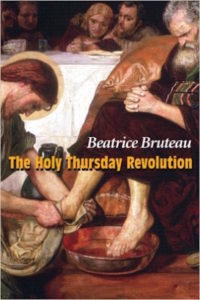 Changing the Narrative from Foe to Friend
Changing the Narrative from Foe to Friend
Is there any hope for a future of better relations and peaceful coexisting between and among communities? Author Beatrice Bruteau says yes, basing her argument on two practices of Holy Thursday: the Footwashing and the Supper, or Holy Communion. She illustrates “how this new paradigm–a movement from Lord to friend–can dramatically alter our personal and social relations, our economic and political practices.” Creating new hopes out of a 2000-year-old tradition, The Holy Thursday Revolution is Bruteau’s longing for the transition from a world of distrust and dominance to one of peace and understanding.
In an excerpt of the 2005 publication, Bruteau writes:
“‘Love your neighbor as yourself.’ This is such a well-known saying among us that we may not realize the profound dissonance involved, but we know that we are not able to live up to this ideal. We have excused ourselves by saying that it is an ideal, after all, and very difficult to attain, and we can only hope to approximate it sometimes and to a certain extent.
But this, according to my thesis, is not the trouble. The difficulty is that this exhortation flies in the face of everything else that our culture encourages and that our worldview sees. If we cannot love our neighbor as ourself, it is because we do not perceive our neighbor as ourself. We perceive the neighbor as precisely not ourself, but as a potential threat (or potential aid) to ourself… It is not a matter of the exhortation being an ideal that is difficult to attain; it is a contradiction of our culture that is strictly impossible to realize, so long as we see the world the way we do.”
Find more information on this book here.
Fellow travelers are scholars, activists, and practitioners that embody the ideals and commitments of the Project on Lived Theology. We admire their work and are grateful to be walking alongside them in the development and dissemination of Lived Theology.
